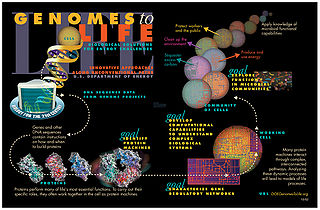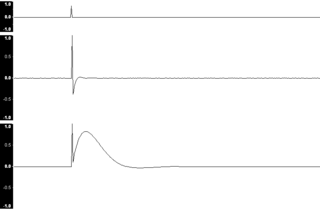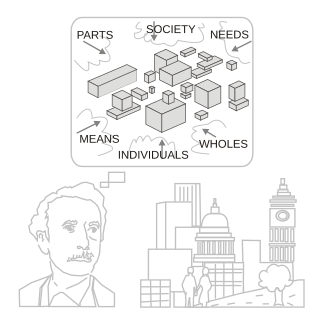A paradigm shift is a fundamental change in the basic concepts and experimental practices of a scientific discipline. It is a concept in the philosophy of science that was introduced and brought into the common lexicon by the American physicist and philosopher Thomas Kuhn. Even though Kuhn restricted the use of the term to the natural sciences, the concept of a paradigm shift has also been used in numerous non-scientific contexts to describe a profound change in a fundamental model or perception of events.
A complex system is a system composed of many components which may interact with each other. Examples of complex systems are Earth's global climate, organisms, the human brain, infrastructure such as power grid, transportation or communication systems, complex software and electronic systems, social and economic organizations, an ecosystem, a living cell, and, ultimately, for some authors, the entire universe.
This aims to be a complete article list of economics topics:

Biogeography is the study of the distribution of species and ecosystems in geographic space and through geological time. Organisms and biological communities often vary in a regular fashion along geographic gradients of latitude, elevation, isolation and habitat area. Phytogeography is the branch of biogeography that studies the distribution of plants. Zoogeography is the branch that studies distribution of animals. Mycogeography is the branch that studies distribution of fungi, such as mushrooms.
Senescence or biological aging is the gradual deterioration of functional characteristics in living organisms. Whole organism senescence involves an increase in death rates or a decrease in fecundity with increasing age, at least in the later part of an organism's life cycle. However, the resulting effects of senescence can be delayed. The 1934 discovery that calorie restriction can extend lifespans by 50% in rats, the existence of species having negligible senescence, and the existence of potentially immortal organisms such as members of the genus Hydra have motivated research into delaying senescence and thus age-related diseases. Rare human mutations can cause accelerated aging diseases.
Business cycles are intervals of general expansion followed by recession in economic performance. The changes in economic activity that characterize business cycles have important implications for the welfare of the general population, government institutions, and private sector firms.
Autecology is an approach in ecology that seeks to explain the distribution and abundance of species by studying interactions of individual organisms with their environments. An autecological approach differs from ecosystem ecology, community ecology (synecology) and population ecology (demecology) by greater recognition of the species-specific adaptations of individual animals, plants or other organisms, and of environmental over density-dependent influences on species distributions. Autecological theory relates the species-specific requirements and environmental tolerances of individuals to the geographic distribution of the species, with individuals tracking suitable conditions, having the capacity for migration at at least one stage in their life cycles. Autecology has a strong grounding in evolutionary theory, including the theory of punctuated equilibrium and the recognition concept of species.

Systems biology is the computational and mathematical analysis and modeling of complex biological systems. It is a biology-based interdisciplinary field of study that focuses on complex interactions within biological systems, using a holistic approach to biological research.

In signal processing and control theory, the impulse response, or impulse response function (IRF), of a dynamic system is its output when presented with a brief input signal, called an impulse (δ(t)). More generally, an impulse response is the reaction of any dynamic system in response to some external change. In both cases, the impulse response describes the reaction of the system as a function of time (or possibly as a function of some other independent variable that parameterizes the dynamic behavior of the system).

Systems science, also referred to as systems research, or, simply, systems, is a transdisciplinary field that is concerned with understanding simple and complex systems in nature and society, which leads to the advancements of formal, natural, social, and applied attributions throughout engineering, technology and science, itself.
The metabolic theory of ecology (MTE) is the ecological component of the more general Metabolic Scaling Theory and Kleiber's law. It posits that the metabolic rate of organisms is the fundamental biological rate that governs most observed patterns in ecology. MTE is part of a larger set of theory known as metabolic scaling theory that attempts to provide a unified theory for the importance of metabolism in driving pattern and process in biology from the level of cells all the way to the biosphere.
The philosophy of biology is a subfield of philosophy of science, which deals with epistemological, metaphysical, and ethical issues in the biological and biomedical sciences. Although philosophers of science and philosophers generally have long been interested in biology, philosophy of biology only emerged as an independent field of philosophy in the 1960s and 1970s, associated with the research of David Hull. Philosophers of science then began paying increasing attention to biology, from the rise of Neodarwinism in the 1930s and 1940s to the discovery of the structure of DNA in 1953 to more recent advances in genetic engineering. Other key ideas include the reduction of all life processes to biochemical reactions, and the incorporation of psychology into a broader neuroscience.

In ecology, r / K selection theory relates to the selection of combinations of traits in an organism that trade off between quantity and quality of offspring. The focus on either an increased quantity of offspring at the expense of reduced individual parental investment of r-strategists, or on a reduced quantity of offspring with a corresponding increased parental investment of K-strategists, varies widely, seemingly to promote success in particular environments. The concepts of quantity or quality offspring are sometimes referred to as "cheap" or "expensive", a comment on the expendable nature of the offspring and parental commitment made. The stability of the environment can predict if many expendable offspring are made or if fewer offspring of higher quality would lead to higher reproductive success. An unstable environment would encourage the parent to make many offspring, because the likelihood of all of them surviving to adulthood is slim. In contrast, more stable environments allow parents to confidently invest in one offspring because they are more likely to survive to adulthood.
Spatial ecology studies the ultimate distributional or spatial unit occupied by a species. In a particular habitat shared by several species, each of the species is usually confined to its own microhabitat or spatial niche because two species in the same general territory cannot usually occupy the same ecological niche for any significant length of time.
The dynamic energy budget (DEB) theory is a formal metabolic theory which provides a single quantitative framework to dynamically describe the aspects of metabolism of all living organisms at the individual level, based on assumptions about energy uptake, storage, and utilization of various substances. The DEB theory adheres to stringent thermodynamic principles, is motivated by universally observed patterns, is non-species specific, and links different levels of biological organization as prescribed by the implications of energetics. Models based on the DEB theory have been successfully applied to over 1000 species with real-life applications ranging from conservation, aquaculture, general ecology, and ecotoxicology. The theory is contributing to the theoretical underpinning of the emerging field of metabolic ecology.
Following is a list of topics related to life extension:
Developmental systems theory (DST) is an overarching theoretical perspective on biological development, heredity, and evolution. It emphasizes the shared contributions of genes, environment, and epigenetic factors on developmental processes. DST, unlike conventional scientific theories, is not directly used to help make predictions for testing experimental results; instead, it is seen as a collection of philosophical, psychological, and scientific models of development and evolution. As a whole, these models argue the inadequacy of the modern evolutionary synthesis on the roles of genes and natural selection as the principal explanation of living structures. Developmental systems theory embraces a large range of positions that expand biological explanations of organismal development and hold modern evolutionary theory as a misconception of the nature of living processes.

Living systems are life forms treated as a system. They are said to be open self-organizing and said to interact with their environment. These systems are maintained by flows of information, energy and matter. Multiple theories of living systems have been proposed. Such theories attempt to map general principles for how all living systems work.

Graeme Donald Snooks is a systems theorist and stratologist who has developed a general dynamic theory to explain complex living systems. His resulting "dynamic-strategy theory" (DST) has been employed to analyse the fluctuating fortunes of life over the past 4,000 million years (myrs) and of human society over the past 2 myrs; to analyse contemporary economic problems ; to explore socio-political issues ; to analyse the emergence, operation, and malfunction of the mind; and to make scientific predictions about the future. New discoveries emerging from Snooks' publications include: existential schizophrenia, strategic frustration, strategic selection, the growth-inflation curve, the strategy function, the logological constant, the Snooks–Panov Vertical, technological paradigm shifts, the Solar Revolution, and, most importantly, the strategic logos. His body of work challenges the existing paradigms of orthodox (neo-classical) economics, climate-mitigation economics, Marxism, neo-Darwinism, evolutionary psychology, self-organisation theory, and all other supply-side systems.
This glossary of biology terms is a list of definitions of fundamental terms and concepts used in biology, the study of life and of living organisms. It is intended as introductory material for novices; for more specific and technical definitions from sub-disciplines and related fields, see Glossary of cell biology, Glossary of genetics, Glossary of evolutionary biology, Glossary of ecology, Glossary of environmental science and Glossary of scientific naming, or any of the organism-specific glossaries in Category:Glossaries of biology.






